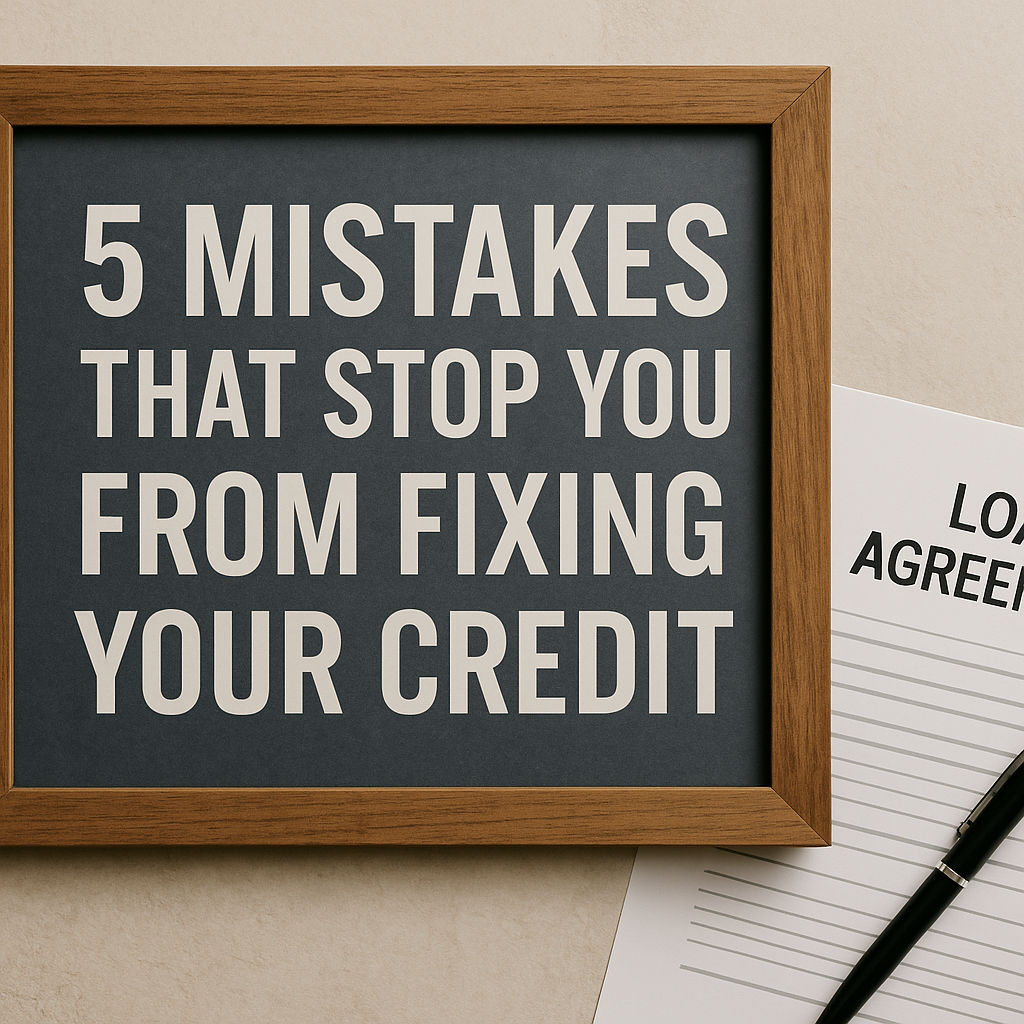Introduction
Rebuilding your credit isn’t easy—but it’s definitely possible. Whether you’re starting over after missed payments, defaulted loans, or financial hardship, your credit score can bounce back. But here’s the truth: some habits, mindsets, and mistakes silently sabotage your progress.
In this article, we’ll explore five of the most common (and costly) credit recovery mistakes—and show you exactly how to avoid them. If your score isn’t improving as expected, one of these could be the culprit.
1. Ignoring Your Credit Reports
A huge number of credit reports contain errors—and those mistakes can drag down your score without you realizing it.
What can go wrong:
- Duplicate accounts
- Incorrect balances
- Accounts marked late that were paid on time
- Identity theft or unauthorized accounts
What to do:
- Get your reports free from AnnualCreditReport.com
- Review all three bureaus: Experian, TransUnion, Equifax
- Dispute errors directly online—most get resolved within 30 days
Checking your credit once a year isn’t enough. Make it a regular habit.
2. Only Paying the Minimum
Paying your bills on time is essential—but paying just the minimum keeps your balances high, which hurts your credit utilization ratio.
Why it matters:
- High balances = lower credit score
- You pay more in interest over time
What to do:
- Aim to pay down your balances aggressively
- Focus on cards with the highest interest rates first
- Use the avalanche method or snowball method to prioritize
Small extra payments—even $50/month—can dramatically reduce your debt and boost your score.
3. Closing Old Accounts Too Soon
You might feel tempted to close credit cards after paying them off—but this can actually hurt your credit.
Why?
- It shortens your credit history length, a factor in your score
- It reduces your total credit limit, making your utilization ratio worse
What to do:
- Keep old accounts open, even if unused
- Use them occasionally for small purchases and pay them off
Closing accounts should be strategic—not emotional.
4. Applying for Too Much New Credit
It’s tempting to apply for new credit when rebuilding—but too many hard inquiries in a short time can lower your score and make you look risky to lenders.
Signs you’re over-applying:
- You’ve been denied several times
- You’re applying just to increase your limits or get a short-term fix
Better approach:
- Apply for one secured credit card or a credit-builder loan
- Wait at least 6 months between applications
- Use pre-qualification tools that don’t impact your score
Pacing yourself shows responsibility and gives your score time to recover.
5. Not Having a Clear Strategy
Rebuilding credit without a plan is like driving blindfolded. Randomly making payments or opening accounts can do more harm than good.
What a strategy looks like:
- Set a target score and timeline (e.g., 680 in 12 months)
- Automate all bills to avoid late payments
- Monitor your score monthly with apps like Credit Karma, myFICO, or NerdWallet
- Use a budgeting tool to avoid overspending and accumulating new debt
Having a system in place keeps you focused and accountable.
Bonus Tip: Not Asking for Help
Trying to do everything alone can make credit recovery slower and more stressful.
Resources to consider:
- Nonprofit credit counselors (like NFCC.org)
- Debt consolidation services (only with trusted institutions)
- Financial coaches or advisors who specialize in credit repair
Getting professional help doesn’t mean you’ve failed—it means you’re smart enough to get support when needed.
Final Thoughts
Rebuilding your credit takes time—but it also takes intention. By avoiding these five common mistakes, you’ll be miles ahead of most people struggling with bad credit.
Here’s your checklist:
- ✅ Review your credit reports monthly
- ✅ Pay more than the minimum
- ✅ Keep your oldest accounts open
- ✅ Limit new credit applications
- ✅ Follow a clear, strategic plan
Credit recovery isn’t about perfection. It’s about progress. And the sooner you stop sabotaging your score, the faster you’ll start seeing results.
